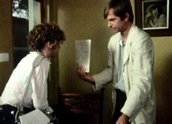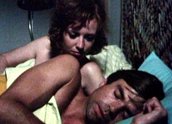


Just Out of Reach (1979)
Synopsis
Just Out Of Reach is a powerful film about the tragic impact of growing up in a dysfunctional family during the 1970s. The film is a dramatised portrait of Cath, a young woman, who becomes increasingly isolated as her family relationships, and then her marriage, break down. The film opens with Cath being rushed to hospital after a suicide attempt, then flips back to when Cath is a teenager to reveal what has led to her wanting to end her life.
Curator’s notes
Just Out of Reach followed Linda Blagg’s powerful first short drama, Just Me and My Little Girlie (1976), which explored the incestuous relationship between a father and daughter. As a writer and director she was a pioneer in making feminist films that looked at family relationships from the daughter’s point of view.
Both films were part of a body of work that emerged from women writers and directors in the 1970s, a time when the women’s movement’s demands that women be the author of their own stories and images coincided with the establishment of film funding bodies that encouraged the making of Australian films. Linda Blagg was an early directing graduate from the Australian Film, Television and Radio School and Just Out of Reach was funded by the newly set-up AFC.
Up until then many of the film narratives of the decade were told from the male point of view which failed to portray the experience of women at the time. Many women started to explore their feelings about family relationships and sexuality through film. The result was some of the best Australian films ever made, films such as Gillian Armstrong’s My Brilliant Career, made in 1979.
The cast and crew of Just Out of Reach reads like a 'Who’s who’ of Australian cinema. It was produced by Ross Matthews, best known for producing Kick (1999), Dallas Doll (1994), Gino (1994) and many other independent Australian feature films. The cinematographer was Russell Boyd and the film starred Lorna Lesley and Sam Neill. Boyd and Neill in particular went on to successful international careers.
Linda Blagg’s script is a compelling study of dysfunctional family relationships. The father (Martin Vaughan) is away most of the time but asserts himself violently on his return. The parents fight constantly and the older daughter, Cath (Lorna Lesley), is the scapegoat for the whole family. Cath’s burgeoning sexuality is confronting and the family seems powerless to deal with it (see clip one).
Cath becomes increasingly isolated until a temporary teacher, Mike (Sam Neill), arrives to take her class for a few weeks. Mike and Cath appear to have a connection. Two years later, when Cath is studying at university, they meet again, develop a sexual relationship and get married. Cath’s horizons have broadened beyond her limited upbringing and she is discovering art, culture and feminism. An important scene is when Kath steals a book from a bookshop, The Female Eunuch (1970) by Germaine Greer – the bible of the women’s liberation movement at the time (see clip two).
Another two years pass and the marriage is disintegrating as Cath tries to assert her needs in the relationship. She wants her study to be taken seriously. Her husband, however, is only interested in his own creative work. This conflict reflects the intense desire for change that many young women felt at the time as a result of seeing their mothers trapped in the domestic routines and loveless relationships of nuclear families in the 1950s and 60s. Finally, Cath has to face the ultimate break-up of her relationship (see clip three). Unable to cope with being alone, she cuts her wrists as she had done once before during a fight with her father.
The structure of the narrative is gripping as it seamlessly makes two-year leaps covering key periods in Cath’s life. When the film was made it broke new ground in portraying female adolescent sexuality, dysfunctional nuclear families, suicide and the impact on relationships as women started to demand an equal role in society. Brilliantly acted and shot, Just Out of Reach stands the test of time. It is insightful drama and sits comfortably alongside other films that were produced during this rich and creative period of the Australian film industry.
Distributed by the AFI, Just Out Of Reach won the Bronze Medallion for Cinematography and was a finalist in the Best Short Film category at the 1979 AFI Awards.
- Overview
- Curator’s notes
- Video 3 clips
- Principal credits
- Find a copy
- Make a comment
- Map
- Add your review



